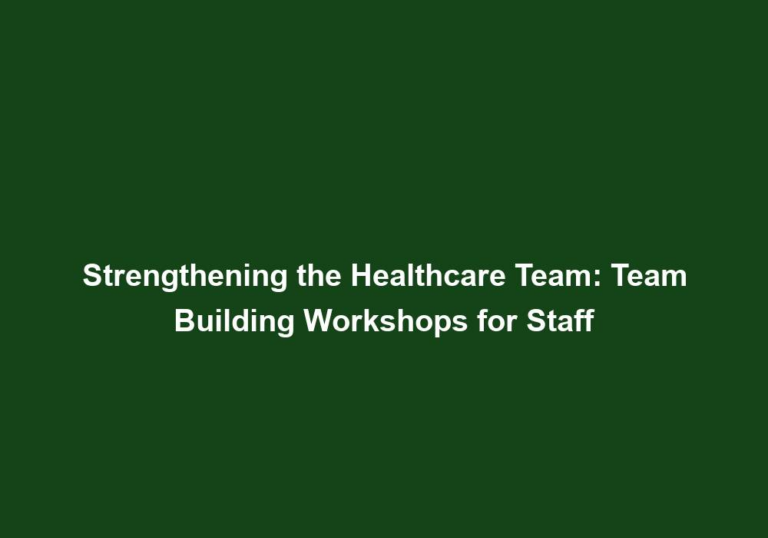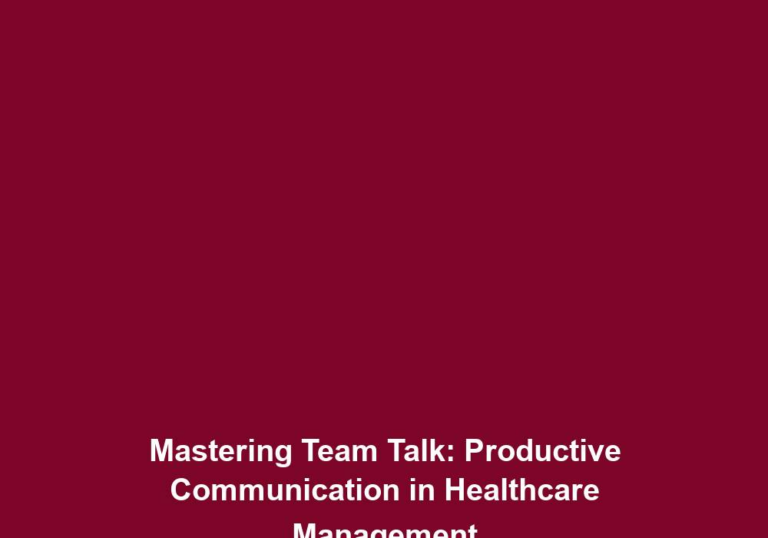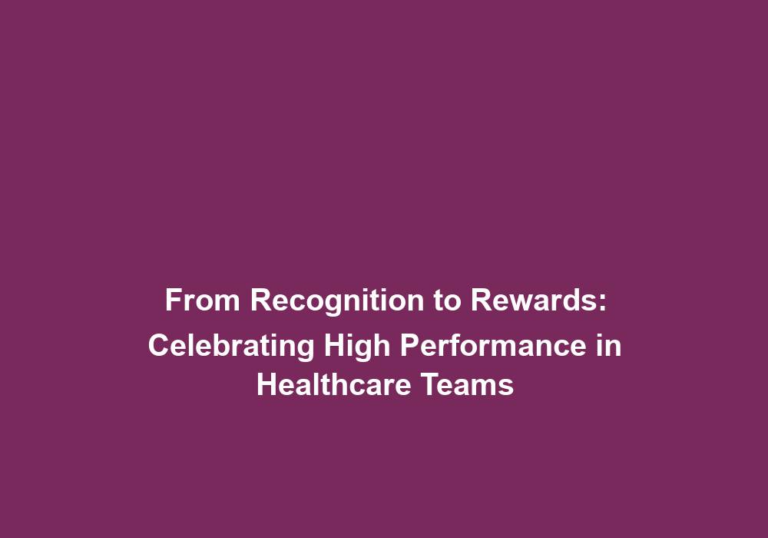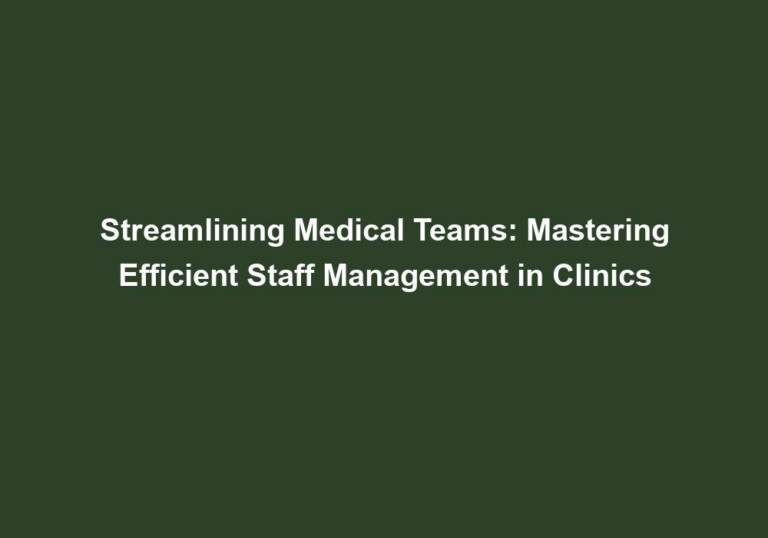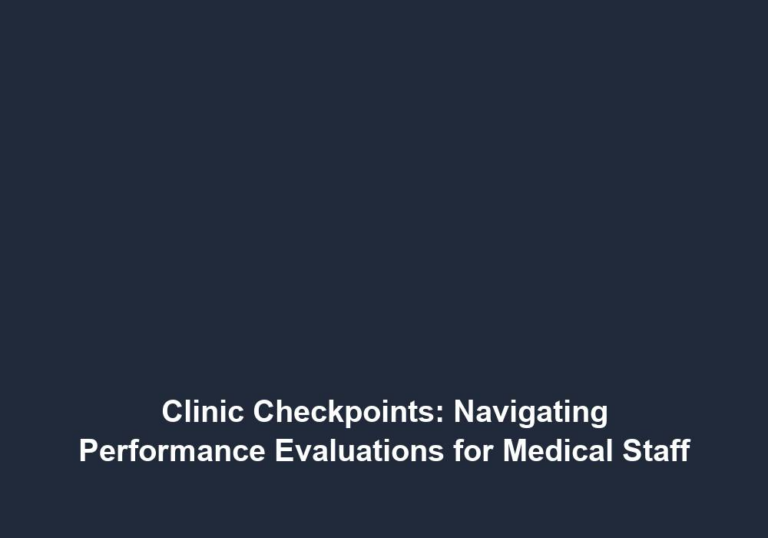Smoothing Ripples: Efficient Conflict Resolution in Healthcare Teams
In the fast-paced and high-pressure environment of healthcare, conflict is inevitable. Healthcare teams often consist of diverse professionals who bring their own perspectives, expertise, and personalities to the table. These differences can lead to clashes and disagreements, affecting team dynamics and ultimately patient care. However, efficient conflict resolution is crucial in maintaining a harmonious and productive healthcare team. This article explores strategies and techniques for smoothing ripples and fostering effective conflict resolution within healthcare teams.
Understanding Conflict in Healthcare Teams
Before delving into conflict resolution strategies, it is essential to understand the common causes of conflict within healthcare teams. Some typical sources of conflict include:
-
Communication breakdown: Misunderstandings, ineffective communication, and lack of clarity can lead to conflicts in healthcare teams. This may occur due to differences in communication styles, language barriers, or misinterpretation of information. It is important for team members to actively work on improving their communication skills and finding common ground to avoid such breakdowns.
-
Differences in values and perspectives: Healthcare professionals come from varied backgrounds, cultures, and experiences, which can result in conflicting values, beliefs, and perspectives. These differences can lead to disagreements and conflicts when making decisions or collaborating on patient care. It is crucial for team members to cultivate empathy and respect for each other’s viewpoints, fostering a culture of open-mindedness and inclusivity.
-
Role ambiguity: Unclear roles and responsibilities within a healthcare team can create confusion and conflicts. When team members are uncertain about their roles or overlap in responsibilities, it can lead to turf wars and power struggles. Establishing clear job descriptions and defining roles can help minimize ambiguity and promote a sense of accountability and cooperation among team members.
-
Limited resources: Healthcare teams often face resource constraints such as time, staff, and equipment. When resources are scarce, conflicts may arise as team members compete for limited resources or struggle to meet patient demands. It is important for healthcare organizations to allocate resources effectively and ensure transparency in decision-making processes to avoid potential conflicts.
Understanding the root causes of conflicts can help healthcare teams address these issues proactively and develop strategies for efficient conflict resolution.
Strategies for Efficient Conflict Resolution
-
Promote open communication: Encouraging open and honest communication is crucial for resolving conflicts in healthcare teams. Team members should feel comfortable expressing their concerns, ideas, and feedback without fear of judgment or retaliation. Establishing regular team meetings, utilizing communication tools, and fostering an environment of trust can facilitate effective communication. Additionally, active feedback mechanisms can be implemented to encourage continuous improvement in communication practices.
-
Active listening: Active listening involves fully understanding and acknowledging the perspectives and concerns of others. It is essential for healthcare professionals to actively listen to their colleagues, patients, and other stakeholders involved in the conflict. By actively listening, team members can gain a comprehensive understanding of the issue at hand and work towards a mutually beneficial resolution. This can involve paraphrasing, summarizing, and asking clarifying questions to ensure accurate comprehension.
-
Conflict resolution training: Providing conflict resolution training to healthcare professionals can equip them with the necessary skills and techniques to handle conflicts effectively. Training can include modules on negotiation, mediation, assertive communication, and emotional intelligence. By enhancing their conflict resolution skills, healthcare professionals can navigate conflicts more efficiently and collaboratively. Continuous training and development opportunities should be offered to ensure ongoing improvement in conflict resolution abilities.
-
Establish clear roles and responsibilities: Clearly defining roles and responsibilities within a healthcare team minimizes ambiguity and reduces conflicts. By understanding their specific areas of responsibility, team members can work cohesively and avoid stepping on each other’s toes. Regularly reviewing and updating role descriptions can ensure that everyone is aware of their responsibilities and accountabilities. Additionally, promoting cross-training and knowledge sharing can help team members understand and appreciate each other’s roles, fostering a sense of unity and cooperation.
-
Collaborative problem-solving: When conflicts arise, healthcare teams should adopt a collaborative problem-solving approach. This involves bringing all stakeholders together to identify the underlying issues, brainstorm potential solutions, and evaluate the pros and cons of each option. By involving all team members in the decision-making process, conflicts can be resolved in a fair and inclusive manner. Encouraging creativity and flexibility in problem-solving can lead to innovative solutions and strengthen teamwork.
-
Mediation and facilitation: In situations where conflicts escalate or become deeply entrenched, seeking external help through mediation or facilitation can be beneficial. A neutral third party can guide the healthcare team through the conflict resolution process, ensuring that all parties are heard and considering various perspectives. Mediation and facilitation can help in finding common ground and reaching a mutually acceptable resolution. It is important for healthcare organizations to have established protocols for accessing mediation services when needed.
Benefits of Efficient Conflict Resolution
Efficient conflict resolution within healthcare teams offers numerous benefits, including:
-
Improved patient outcomes: By addressing and resolving conflicts, healthcare teams can focus on providing high-quality patient care. Collaboration and effective communication resulting from conflict resolution lead to better treatment plans, reduced medical errors, and enhanced patient safety. This ultimately contributes to improved patient outcomes and satisfaction.
-
Enhanced teamwork and morale: Efficient conflict resolution fosters a positive team culture characterized by trust, respect, and open communication. This, in turn, strengthens teamwork, boosts morale, and creates a supportive work environment where team members can thrive. As team members feel valued and supported, they are more likely to collaborate effectively and contribute to a positive team dynamic.
-
Reduced staff turnover: Conflict, if left unresolved, can lead to dissatisfaction, burnout, and ultimately, staff turnover. By efficiently resolving conflicts, healthcare teams can retain talented professionals and reduce the costs associated with recruitment and training. This promotes stability within the team and ensures continuity of care for patients.
-
Continuous improvement: Conflict resolution facilitates learning and growth within healthcare teams. By addressing conflicts, teams can identify areas for improvement, implement changes, and refine their processes. This commitment to continuous improvement leads to enhanced efficiency, quality of care, and patient satisfaction. Regular evaluation and feedback mechanisms can be put in place to monitor the effectiveness of conflict resolution strategies and identify areas for further improvement.
Conclusion
Conflict is an inherent part of working in healthcare teams, but efficient conflict resolution strategies can help smooth ripples and maintain harmonious team dynamics. By understanding the root causes of conflicts, promoting open communication, actively listening, and utilizing techniques such as collaborative problem-solving and mediation, healthcare teams can resolve conflicts effectively. The benefits of efficient conflict resolution extend beyond team dynamics, positively impacting patient outcomes, teamwork, staff morale, and continuous improvement within healthcare organizations.
Note: This revised content is shown in markdown format.


